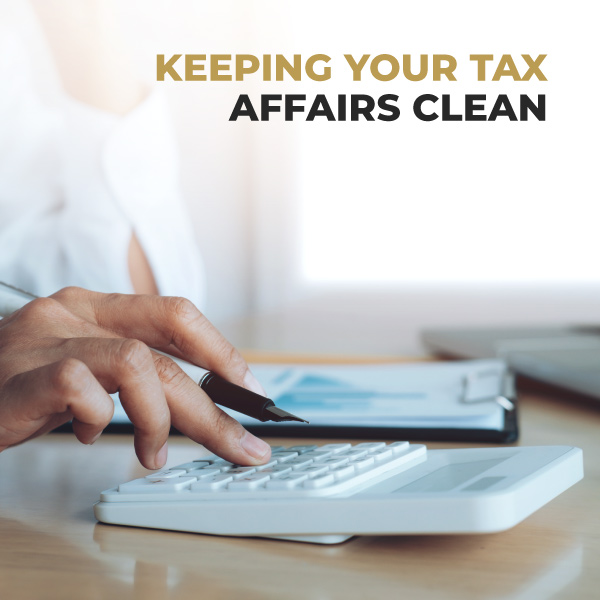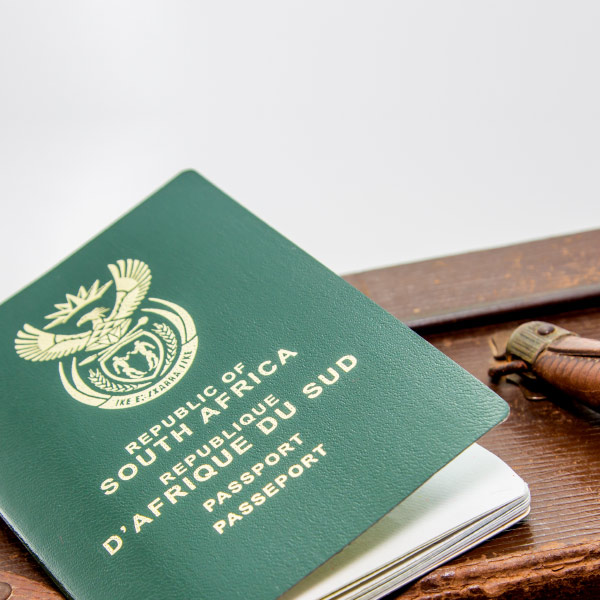KEEPING YOUR TAX AFFAIRS CLEAN
In our recent newsletter, Tax compliance or jail, we warned that your clients could face penalties or prison sentences for negligent non-compliance with South Africa’s tax legislation.
We noted that the South African Revenue Services (SARS) had been given the green light to criminalise otherwise well-meaning taxpayers for making errors or mistakes on their annual tax returns or failing to respond to requests for information, among other shortcomings. This writer was concerned with the concept of negligent non-compliance against the backdrop of an increasingly complex taxation framework.
Interrogating the expert
We put some questions to Jean du Toit, Attorney and Head of Tax Technical at Tax Consulting South Africa, to set our minds at ease with regards the fairness of the changes. What follows is our question-and-answer session on some of the changes introduced by the 15 January 2021 assent to the Taxation Laws Amendment Act No. 23 of 2020 (TLAA) and the Tax Administration Laws Amendment Act No. 24 of 2020 (TALAA). We begin with the potential prosecution of taxpayers for negligent non-compliance before reflecting on the impact of these changes on emigration and working offshore.
Gareth Stokes: What can we expect from SARS in applying the criminal non-compliance provision?
Jean Du Toit: It is not difficult for SARS to discern if you are non-compliant from an administrative perspective. However, it is not clear how aggressively this will be enforced and how many cases will actually be handed over to the National Prosecuting Authority (NPA). The Commissioner has made it clear that SARS will adopt a zero tolerance policy when it comes to non-compliance; but whether this new provision will actually be invoked remains to be seen.
Gareth: Is there not a concern that otherwise law abiding citizens will be criminalised by this provision, especially given how complex tax regulation is? My view is that an auditor could find fault with almost any tax return submitted on the basis of negligent non-compliance, which gives the NPA a blank cheque for prosecution, as it were.
Ignorance of the law was never a defence…
Jean: I do not think the goal is to criminalise taxpayers as far and wide as possible; the purpose is perhaps to send a message that taxpayers can no longer plead ignorance and that they are required to take ownership of their tax affairs. It is also important to remember that negligence still establishes a degree of culpability and that you will be measured against the standard of reasonableness. The court or prosecutor would have to consider whether a reasonable taxpayer would have acted in the same manner and whether or not an individual fell short of this standard. It is not to say that every mistake will land you behind bars; the circumstances of each case must still be assessed.
Gareth: Is it, in your opinion, time for all taxpayers to file taxes through a tax professional?
Jean: As noted, the amendment signals a time for taxpayers to take ownership of their affairs, which means they should either take it upon themselves to understand what is required or rope in a professional to assist. It is not impossible to do it yourself; but it must be acknowledged that tax law can be inherently complex and where you do not have the time to fully come to grips with what your obligations involve, it is probably best to get someone to assist.
Gareth: Readers can refer to my opinion piece SARS: Learn from your mistakes; go directly to jail! for more on this topic. Our QNA now focuses on the changes with respect to an emigree withdrawing his or her retirement fund benefits. Jean, could you briefly explain the changes and effective dates?
Jean: Prior to the amendment, a person would be allowed to withdraw their retirement benefits upon emigration as soon as they completed the emigration process through the South African Reserve Bank (SARB). In other words, the old dispensation allowed for an immediate withdrawal. From 1 March 2021, a new test will apply; taxpayers can only withdraw their retirement benefits if they can prove they have ceased to be tax resident for an uninterrupted period of three years. You can still use the old process if you submit a complete application on or before 28 February 2021.
Gareth: What advice can you give to someone who is currently living and working overseas and intends emigrating at some point?
Handling your tax affairs in line with your intention
Jean: Ideally, your tax compliance status should align with your factual reality and your intention. Where you have the intention to permanently leave South Africa, your tax filing position should reflect that you are non-resident, as well as your exchange control status (although we are moving away from a residency system from an exchange control perspective). From a tax perspective, someone who intends permanently leaving South Africa would only be taxable in South Africa on income earned from a South African source. It is important to note that when you cease tax residency, there is a deemed disposal of your worldwide assets, save for immovable property situated in South Africa, which, depending on your asset profile, may trigger a capital gains tax liability.
Gareth: What advice can you offer to someone who is currently living and working overseas and intends returning to SA? Can they just carry on ‘as is’?
Jean: The same principle applies in this instance; where you intend to return to South Africa you will likely still be tax resident for purposes of our domestic tax laws. This means you are liable for taxation on your worldwide income. In this instance, you may have two options in terms of tax relief. First, you can claim the foreign employment exemption under section 10(1)(o)(ii) of the Income Tax Act, provided you meet the requirements, or you can claim relief under a double tax agreement, in terms of which you may cease residency irrespective of your intention to return to South Africa.
Gareth: What are the implications on those working offshore of the reduction from 183 days to 117 days to qualify for the foreign employment exemption?
Jean: Ordinarily, if you want to claim the foreign employment exemption, you need to spend more than 183 days in aggregate outside South Africa during a 12-month period. Due to the fact that many expats could not leave South Africa [during part of 2020] as a result of the lockdown, the aggregate number of days have been reduced by 66 days to 117 days, which reflects the period when the country was in levels 5 and 4 of lockdown. This is not a permanent amendment and would not apply to the 2022 year of assessment.
Gareth: Can you comment on the income tax implications for an SA-registered taxpayer who exceed the 117 days abroad?
Double taxation agreements in play
Jean: If you meet the requirements, then your remuneration earned in respect of services rendered outside South Africa is exempt from income tax in this country. The exemption is capped at R1.25 million and you will be subject to tax in South Africa for every rand earned in excess of this amount. So, where you do pay tax in South Africa, and earn R3 million, the difference of R1.75 million is subject to tax in South Africa. Where you pay tax in your host country you may qualify for a credit from SARS.
For example, you earn R2 million for services performed in the UAE, then R750 000 will be taxable in South Africa. It is likely that you will not pay any income tax in the UAE so you will not be eligible for a credit. Where you earn the same amount in a higher tax jurisdiction such as Belgium, you will likely pay tax at the same or higher rate and you will get a credit to the extent that you would have paid tax in South Africa on the same amount.
Source: FA News
![2025-logo-[Recovered] Tax Consulting South Africa](https://www.taxconsulting.co.za/wp-content/uploads/2025/01/2025-logo-Recovered.png)



